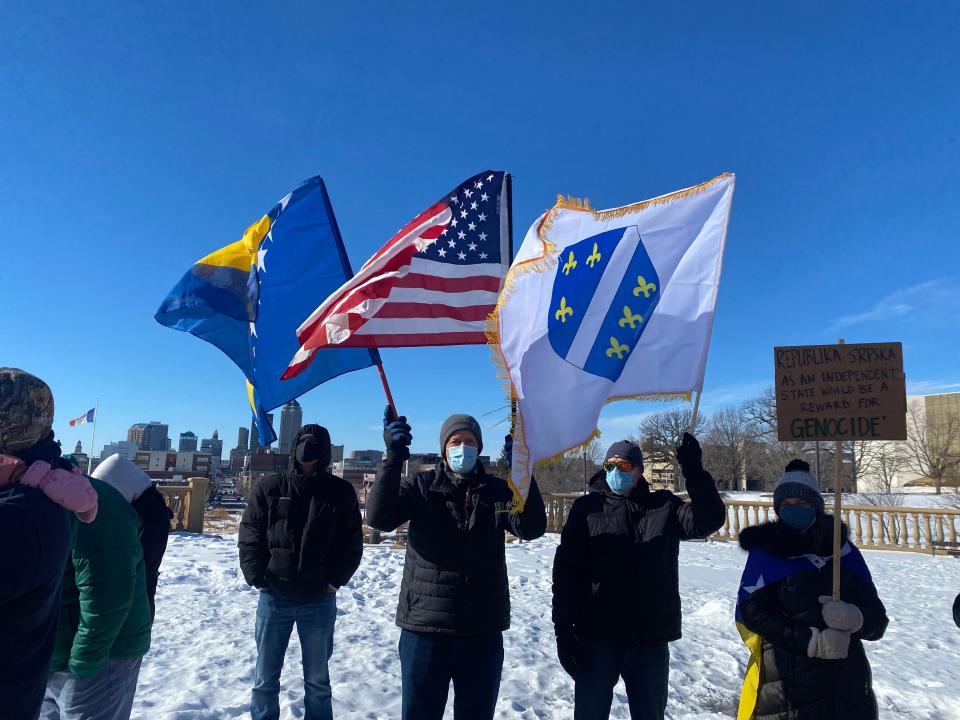UNF students: Another war in Bosnia threatens global stability and U.S. must intervene
While most Americans cannot find Bosnia and Herzegovina on a map, its security is integral to that of the U.S. Instability in Europe has triggered U.S. engagement in two world wars and military intervention to stop genocide in the county in the 1990s.
Today’s threat of a breakup in this fragile country could trigger renewed war. The U.S. must get off the sidelines and protect our core interest in stability in the region.
What happens in Bosnia impacts the U.S., including Jacksonville. Nearly 30,000 Bosnians live in Florida, mostly in Northeast Florida. In fact, our class includes a woman of Bosnian descent, whose parents fled the 1990s genocide. We are proud that Jacksonville provides refuge for so many immigrants — but we must also ensure our foreign policy reflects their interests — and those of the U.S.
Political science students: Ideas to help drive change in North Africa
UNF at 50: Five decades of learning, growing and a look ahead
LettersAs pandemic continues and flu season rages, families need solid leave policies
Simply put, Bosnia is on the brink of another war. The instability gives Russia a foothold in the region, encourages criminal elements, and threatens the stability of Europe. As the architect of the Dayton Peace Accords, signed Dec. 14, 1995, why are we not doing more now?
To address this situation, our class developed a number of recommendations. The Dayton Peace Accords were meant to be temporary and are dangerously out of date. It makes reforms impossible and has left Bosnia with a dysfunctional government consisting of three presidents and lacking minority representation.
The division of the presidency among the three main ethnicities — Bosnian, Croatian, and Serbian — has led to entrenched opposition to any compromise which is blocking any envisioned final agreement.
In addition, other ethnicities, such as Jewish and Roma, are excluded from the right to take these positions in government, a discriminatory policy that has been condemned by the European Court of Human Rights.
Current polls show that the people want an end to the tripartite government. Therefore, it is time the people had a say in their future. To highlight the will of the people, the government should engage a respected international firm to conduct a public opinion poll on replacing the tripartite presidency with a single federated state with offices open to all ethnicities. While some have expressed concerns over the history of violence due to nationwide referendums, the citizens of Bosnia should determine their future.

Assuming, as expected, the poll confirms support for major constitutional changes, the international community should work with the Bosnian government to achieve the necessary constitutional reforms to reflect the will of the people. Such changes would address the major obstacles to achieving a stronger democracy in Bosnia.
The U.S. should push for the removal of Russia from the U.N. Security Council. Its invasion of Ukraine violates the UN Charter and should negate the 1991 decision to enable Russia to inherit the UN Charter’s seat for the USSR. The U.S. must launch a procedural vote in the UNSC for Russia to be expelled and replaced by Ukraine, an original founding member state as negotiated at Yalta.
No veto is allowed but rather nine affirmative votes would ensure the measure’s passage.
A campaign to gain support of the other non-permanent members seated next January will be critical. If successful, this would be one of the strongest costs imposed against Russia for its unprovoked and brutal invasion of Ukraine. If Russia were cut from the Security Council, it would lose its grip on areas within its influence; such as Serbia, Transnistria, Moldova and the Caucasus region.

Lastly, the international community must work to make opportunities more available for the youth. A central Ministry of Education is key to increasing media literacy, technical skills and opportunities to study abroad. Improving employment opportunities is also important.
Currently the country’s Transparency International score is 35/100, deeming it extremely corrupt. This can be changed with a thorough reform of the judicial system that allows the judiciary body to have full financial and institutional independence. Economic growth can be properly achieved through a reconceptualization of the Open Balkan Initiative into what we have deemed the “Balkan Prosperity Initiative.”
This would be backed by infrastructure investments from the west and economic opportunities for the youth, the future of Bosnia.
What happens in Bosnia does not stay in Bosnia. It’s time for the U.S. to take the lead again to secure our interests in the Balkans and fulfill our legacy in the region.
UNF students visited Washington, D.C. on Nov. 16-18 and presented their recommendations to officials at the Departments of State and Defense; the National Security Council; the embassies of Russia, Bosnia and Herzegovina; the leader of Bosnian party Platforma za progres (Platform for Progress); the staff of Sen. Rick Scott; experts at the Crisis Group and the Johns Hopkins University School of Advanced International Studies; and UNF alumni currently working in D.C. They also visited the National Archives and the Florida House.
This guest column is the opinion of the author and does not necessarily represent the views of the Times-Union. We welcome a diversity of opinions.
This article originally appeared on Florida Times-Union: UNF students: The U.S. must act to stop another war in Bosnia

